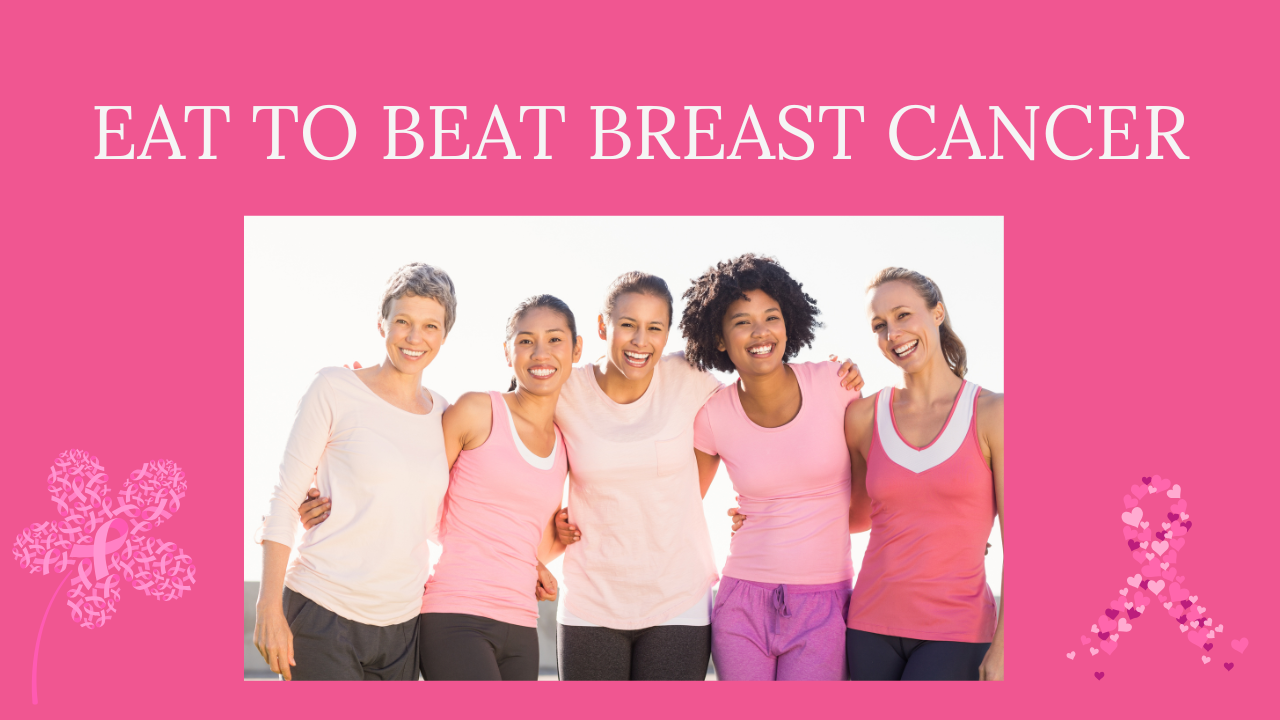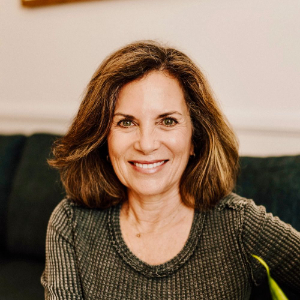Eat to Beat Breast Cancer
Oct 16, 2025
Breast Health After 50: Your Complete Plant-Based Prevention Guide
October reminds us to focus on breast health, but honestly? I think about this every single day. As a nurse, health coach, and a woman over 50 myself, I know that the choices we make today shape our tomorrow. And here's what really gets me excited: we have so much more power than we realize.
Let me be clear upfront: I'm sharing evidence-based information to help you make informed decisions, but this is NOT medical advice. Always discuss any changes to your diet, supplements, screening schedule, or health habits with your personal physician.
The Mammogram Question: What Women 50+ Actually Need to Know
Here's where things have shifted. In 2024, guidelines changed, with the U.S. Preventive Services Task Force officially lowering the recommended screening age from 50 to 40, and different organizations have slightly different guidance for older women.
For women 55 and older, the current recommendations are:
- Continue annual mammograms, OR
- Switch to every other year (biennial screening)
- Continue as long as you're in good health and expected to live at least 10 more years
Notice that phrase "expected to live at least 10 more years"? That's the key. Screening makes sense when early detection would actually lead to treatment that improves outcomes for you personally.
Here's the important update: Starting in September 2024, mammography centers must notify you about your breast density—because dense breast tissue increases cancer risk and may require additional screening methods.
Dense Breasts? Here's What You Need to Know
If you have dense breast tissue, supplemental screening options include breast ultrasound, breast MRI (which has 81-100% sensitivity and is considered the most supported modality), and 3D mammography.
The conversation with your doctor should include your personal risk factors, family history, overall health status, and whether additional screening is right for you.
Do You Still Need Breast Self-Exams?
This has changed significantly. The American Cancer Society no longer recommends breast self-exams as routine screening. However—and this is important—approximately 50% of breast cancers in women 50+ are still self-detected.
The shift is from formal BSE to breast awareness. Know what's normal for YOUR breasts. Pay attention to changes. Don't stress about a monthly ritual, but DO notice if something feels different and report it to your healthcare provider.
Family History & Genetics: What You Need to Know
If a mother, sister, or daughter had breast cancer, your risk is increased—approximately doubling it. But here's what matters: the age at which they were diagnosed.
Higher genetic risk if your relative was diagnosed:
- Under age 50
- With ovarian cancer at any age
- With multiple cancers
- If there are multiple relatives affected
Lower genetic risk (like if your mother was diagnosed at 70) suggests it was likely NOT related to a highly penetrant genetic mutation like BRCA.
Should You Get BRCA Testing?
BRCA testing isn't recommended for everyone. You may benefit from genetic counseling and possibly BRCA testing if you have:
- Multiple family members with breast or ovarian cancer
- A family member diagnosed with breast cancer under age 50
- A family member with ovarian cancer at any age
- Male breast cancer in your family
- Ashkenazi Jewish ancestry with any family history of breast/ovarian cancer
First step: Complete a risk assessment with your doctor. If indicated, you'd receive genetic counseling before any testing.
The good news: Even if you have genetic risk, lifestyle factors (diet, exercise, weight, alcohol) still matter significantly for prevention and outcomes.
What Actually Reduces Your Breast Cancer Risk
While screening is important, here's what most doctors wish patients knew: what you do every single day matters more than screening schedules.
Research consistently shows that lifestyle factors dramatically reduce breast cancer risk:
- Regular exercise (150-300 minutes weekly)
- Maintaining a healthy weight
- Eating a whole food plant-based diet
- Minimizing or eliminating alcohol
- Not smoking
- Managing stress and getting adequate sleep
- Staying socially connected
But let's be real—knowing this and actually doing it are two different things.
The Plant-Based Plate That Protects You

Here's the framework that changes everything:
50% Fruits & Vegetables - The foundation. Deep leafy greens, brilliant berries, orange sweet potatoes, purple cabbage.
25% Whole Grains - Brown rice, quinoa, oats, whole wheat. These provide the fiber that's critical for hormone metabolism and breast health.
25% Legumes, Nuts, Seeds & Plant-Based Proteins - Black beans, lentils, chickpeas, tofu, tempeh, walnuts, hemp seeds. Powerhouses providing protein, healthy fats, and protective compounds.
Am I telling you to give up anything you eat that's NOT on this plate? No--I'm encouraging you to visualize this plate as you make food choices and compose your meals and snacks. Every nutritious food you add makes a difference and adds to your breast cancer prevention plan.
14 Foods That Fight Breast Cancer
There are 14 categories of plant-based foods backed by science to help your body fight breast cancer. Here's a glimpse:
Leafy Greens (kale, spinach, arugula, chard) - Rich in folate and compounds that support healthy estrogen metabolism
Cruciferous Vegetables (broccoli, cauliflower, Brussels sprouts, cabbage) - Contain sulforaphane and indole-3-carbinol, which help metabolize estrogen safely
Berries (blueberries, raspberries, blackberries, cranberries) - Packed with anthocyanins and ellagic acid that fight cancer cell growth
Mushrooms (shiitake, maitake, portabella) - Contain aromatase inhibitors that reduce estrogen production
Soy (tofu, tempeh, edamame, miso) - Contrary to myths, whole soy foods are PROTECTIVE against breast cancer due to isoflavones. Soy isoflavones were associated with a 26% reduced risk of breast cancer recurrence in a meta-analysis of 11,837 women.
Plus 9 more categories including whole grains, beans/legumes, nuts & seeds, flaxseed, turmeric, spices, and seaweed.
The strategy? Choose two items from each category each week. Simple. Sustainable. Powerful.
What About Coffee and Tea?
Studies suggest coffee may improve survival after breast cancer, possibly by reducing high levels of insulin and inflammation. Yes, you can have your coffee! 2-4 cups daily is considered safe for most people.
Green tea especially contains EGCG, a powerful anti-cancer compound. Both regular and decaf coffee contain beneficial antioxidants.
The Fasting-Mimicking Diet: Emerging Science Worth Knowing
Research shows that periodic cycles of a fasting-mimicking diet (FMD) can protect normal cells while potentially killing damaged cells, reduce inflammation, and promote multi-system regeneration. A 2024 study found that FMD appeared to increase the efficacy of chemotherapy in breast cancer patients.
Is this the answer to breast cancer prevention? Not yet. The research is promising but still emerging. Periodic FMD protocols lasting 5 days, repeated once every 3 months or less, show potential to prevent different types of cancers.
Important note: If you're considering the fasting-mimicking diet or any fasting protocol, discuss it with your physician first, especially if you have any health conditions, take medications, or have a history of eating disorders.
The Hormone Therapy Question (Balanced Perspective)
For years, women have been terrified of hormone therapy because of how early studies were misinterpreted. The truth is far more nuanced.
What actually matters:
- Timing: Starting hormones close to menopause has a different risk profile than starting years later
- Type of hormones: Bioidentical estrogen plus progesterone differs from older synthetic combinations
- Delivery method: Transdermal vs. oral matters
- Your baseline risk: Your personal and family history affects the equation
- Quality of life: Your experience of menopause symptoms matters too
The key conversation shouldn't be "hormones are scary, so I can't take them" but rather "what are MY specific risks and benefits?"
And here's something many women don't know: maintaining a healthy weight, exercising regularly, and following a whole food plant-based diet may help your body metabolize estrogen more effectively and reduce some hormone-related cancer risks.
Putting It All Together: Your Breast Health Strategy
Screening: Get appropriate mammograms based on your age and risk factors. Know your breast density. Practice breast awareness.
Nutrition: Use the plant-based plate framework. Eat the 14 categories of protective foods. Keep it simple—choose two from each category each week.
Movement: 150-300 minutes of exercise weekly. Walking, dancing, yoga, swimming, strength training—pick what you enjoy.
Lifestyle: Minimize alcohol, don't smoke, manage stress, prioritize sleep, stay connected.
Support: Consider working with a health coach if you want personalized guidance to make these changes stick.
Ready to Take Action?
You have more power than you realize. The choices you make today directly impact your breast health tomorrow.
Get the Full Blueprint
I've created a comprehensive "Eat to Beat Breast Cancer: 14 Plant-Based Foods to Help Fight Breast Cancer" guide that includes:
- The Plant-Based Plate framework
- All 14 food categories with serving sizes and why they protect you
- A complete 7-day plant-based meal plan
- Shopping lists (including the "choose 2 from each category" strategy)
- Updated 2024-2025 screening guidelines
- Tips for sustainable implementation
It's my gift to you—everything you need to start protecting your breast health today.
Want Personalized Support?
One-on-One Health Coaching
If you've downloaded the guide and you're thinking, "This is great, but I know I need someone in my corner to help me actually implement this"—that's exactly what I do.
As your health coach, I'll help you:
- Create a breast-protective eating plan that fits YOUR life
- Overcome the specific obstacles that have stopped you before
- Build sustainable habits that stick without willpower
- Navigate lifestyle changes with support and accountability
→ Schedule Your Free 15-Minute Discovery Call
No pressure, no sales pitch. Just a conversation about your health goals.
Special Interest Areas
Interested in Fasting-Mimicking Diets?
I offer personalized Prolon coaching support to guide you through the experience safely and effectively. You can also purchase Prolon and other L-Nutra products at significant provider discounts through my provider site.
Interested in Community & Transformation?
When my signature coaching program Sexy in Your 60s opens again in 2026, you'll get everything you need to reclaim your energy, confidence, and vitality—with the support of an amazing community of women on the same journey.
→ Join the Waitlist for Sexy in Your 60s
The Bottom Line
Breast cancer prevention isn't about perfection. It's about consistent, small choices that compound into significant health benefits. It's about knowing what protects you and then actually doing it—with support if you need it.
You deserve to feel amazing in your body. You deserve to live fully, not fearfully. And you absolutely can make lifestyle choices that dramatically reduce your breast cancer risk while increasing your vitality, energy, and joy.
That's exactly what's possible.
Let's get started.
With you,
Dvora
Disclaimer: This article contains recommendations for healthy eating and lifestyle habits that can help support breast health and potentially reduce cancer risk. It is not medical advice. Please check with your physician to make sure your nutrition choices, exercise routine, screening schedule, and health decisions are appropriate for your personal health circumstances and risk factors.
Dvora Citron, RN MS, NBC-HWC
Health and Well-being Coach, Certified in Plant-Based Nutrition
www.slant2plants.com
Last Updated: October 2025
Don’t Miss What’s Coming Next
Feeling inspired to move forward with more purpose, energy, and joy?
You’ll want to be first to know when Sexy in Your 60s opens again in 2026 — my signature coaching program created for women 50+ who are ready to feel more vibrant, confident, and alive in every season of life.
Join the waitlist now to stay connected, receive my latest blog posts and wellness updates, and get early access — including a special opportunity to sign up early coming soon.
I’ll make sure you don’t miss a thing.


